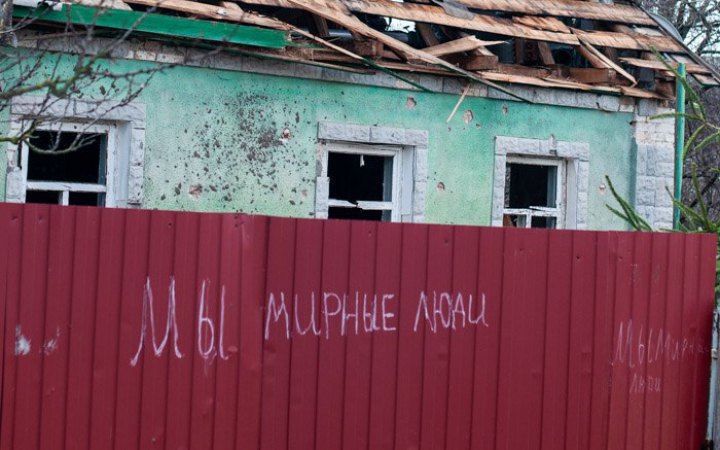Photo: credit of Oleksandra Honcharuk
Oleksandra Honcharuk
After the village was liberated and had its communications resumed, we asked Oleksandra to tell us how villagers survived during these three weeks, what russians did and how they were surprised by toilets inside houses, as well as about shootings, cannons in vegetable gardens and other signs of russian “peace”.
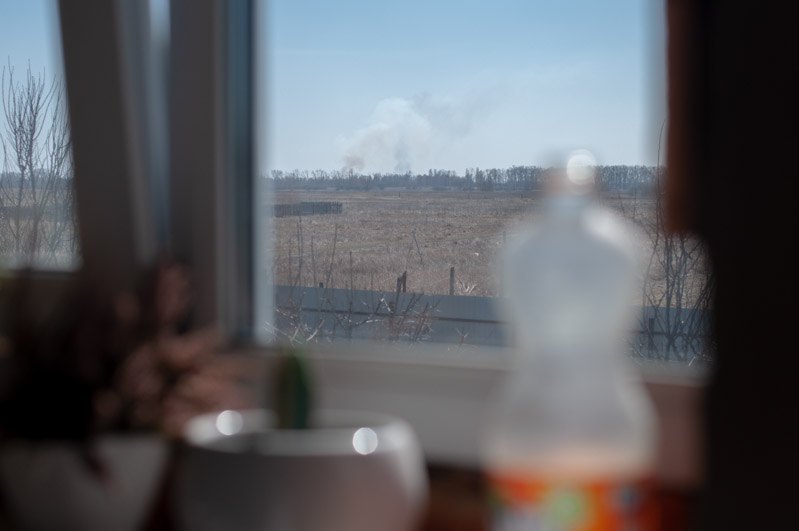
Please tell us how it all started.
It all started when on 25 February our air defense system hit a russian missile for the second time and it landed in our neighborhood, Pozniaky. For the second day in a row I wanted to take my child away, but was afraid to do it. My friend, artist Tamara Shevchuk, invited me to her place outside of Kyiv. When the missile landed, I called her and asked to come and get us. She arrived with a car and took me and my daughter to her place. The first week was life as usual, everything was ok. At night we heard fighting at a distance, it was artillery in action, though we did not realize how close it was to us. Then on 8 March russian military forces entered our village with explosions, machine guns and everything else.
We got ready in advance. In the basement we had beds and stock of food for long-term storage. In general, we were prepared for all of it. Since then our half-life in the basement started, with me spending nights listening rather than sleeping. I heard artillery working, both ours and theirs, and how “bayraktar” reached us. I am pretty tough, my husband was in a Right Sector unit and got killed in 2018. So I am somewhat familiar with the war. But anyway I could not take it anymore, so we settled in the basement.
Around the first or the second day of occupation, the lights went off as russian shells broke high-voltage cables. In a couple of days, gas supply was cut off as well.
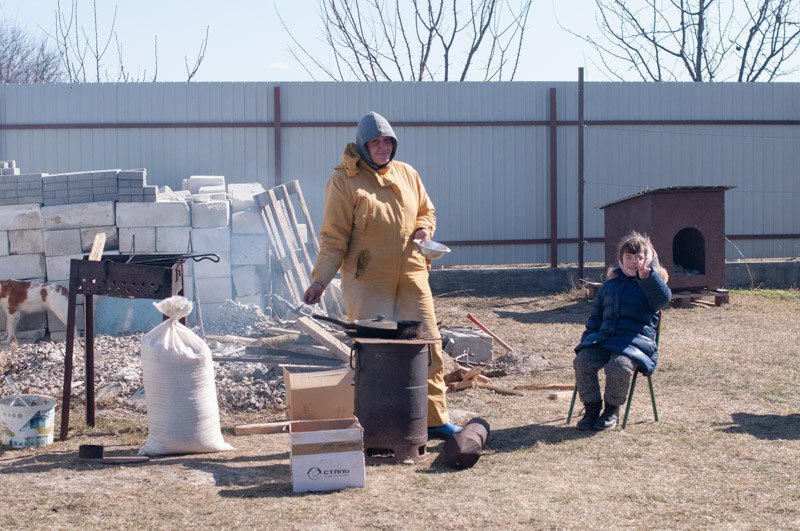
Photo by Oleksandra Honcharuk
How did you find out that russians entered the village?
Noone expected that they would be moving from one village to another. We thought they were going to take some strategic facilities.
People started spreading the word on what was happening. For instance, we knew that russians raided civilian houses before they came to our place.
“Russians positioned two cannons just 100 meters from us. One was directed at the neighboring village, another at our own village. This is what they do: shoot at the village and then say it was the UAF (Armed Forces of Ukraine).”
They usually arrived at a point in a village, installed their military equipment, raided all houses in the proximity, then collected their stuff and left.
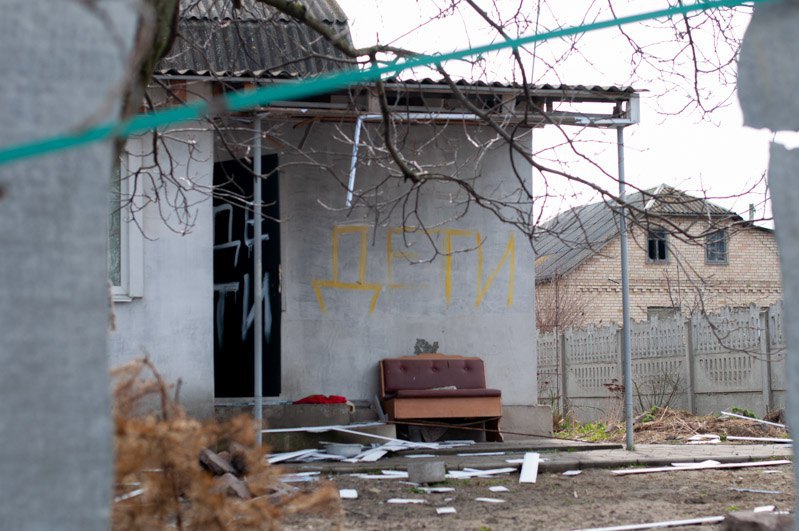
Photo by Oleksandra Honcharuk
What did they do in houses they raided?
It depended on whether there were any people there. If no one was home, they just destroyed everything inside. Shot at walls, particularly if the house was in good condition. Trashed everything they saw.
There were houses from which people were kicked out. Those were further occupied by russians. 15 minutes to leave - people picked up what they could, usually children and passports, and left to stay with the neighbors.
If there were people inside, like in our place, soldiers came over and required food. Normally they took half of what was available at the housekeeping. They could take phones. They had two bags full of phones and they were choosing which ones to take - they left behind push-button ones.
There were no lights, generators were not available everywhere, so phones went dead and we essentially had no connection.
Russians took alcohol, cigarettes. But only packaged items. They did not touch unpackaged and ready-to-eat food.
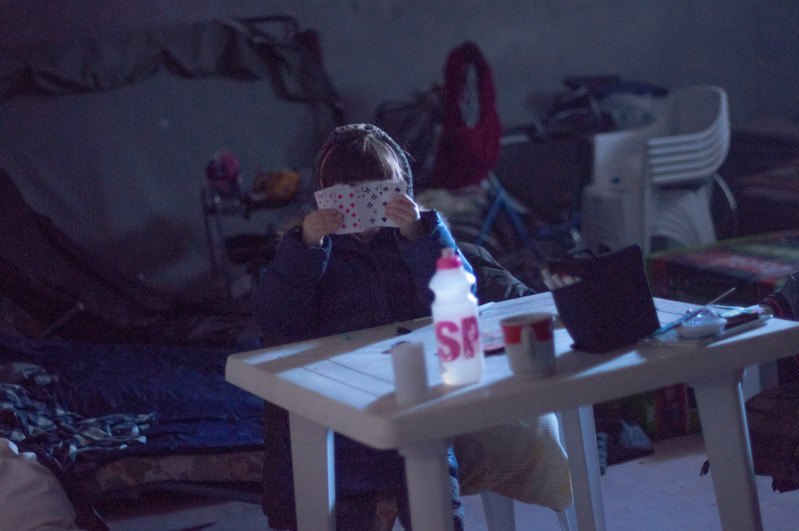
Photo by Oleksandra Honcharuk
Were they afraid you would poison them?
Yes, they were. At night they did not walk around the village. In the daytime, they moved in groups of three-four people.
What happened when russians came to your place?
It was scary, as it was the first time when we saw the enemy close. We stayed in the basement and heard something flying and exploding above us. But we held on and kept our sense of humor. We had my daughter with us: she would say something funny and it took the pressure off.
And then we heard our gate squeaking. So we realized that they arrived. We heard them walking inside the house - it was very scary. They walked on and on. Then our door opened and they asked: “Are there people here?”. My friend said: “Yes, we are here”. And she went out to see them.
“It turned out that three short, scrawny soldiers came to our place, about 18-20 years old. Worn-out, dirty. They had no armor, carried some ancient Kalashnikovs and had helmets dating back to Soviet times, just a piece of cloth stretched on top of them. They stole some random stuff from us and were very happy to see a car in the garage. As well as the generator.”
At that time Russians were often taking cars from civilians, so that RSGs (reconnaissance and sabotage groups) could use them. They really liked the car and so they took it, leaving behind some cupronickel forks they were planning to get. They took a Christmas garland and even scented home sticks. They also picked up a naked girl painting, semi-finished food products and sealed liquor bottles. Nothing particularly valuable. For instance, they did not touch silver jewelry in the bathroom. Or anything that had a trident [central element of Ukrainian coat of arms] on it.
My friend’s father later saw that garland on the antenna of their APC (armored personnel carrier). They also had generators loaded on their APCs. All of that looked like an anecdotal gypsy camp - everything covered by pictures and glittering trash.
We later located the car, the owner had extra keys. Inside the car we found a plate with the word “Children” on it. Apparently they thought of fixing it somehow to the car, but failed to do it. The car is really noticeable and many people know the owner.
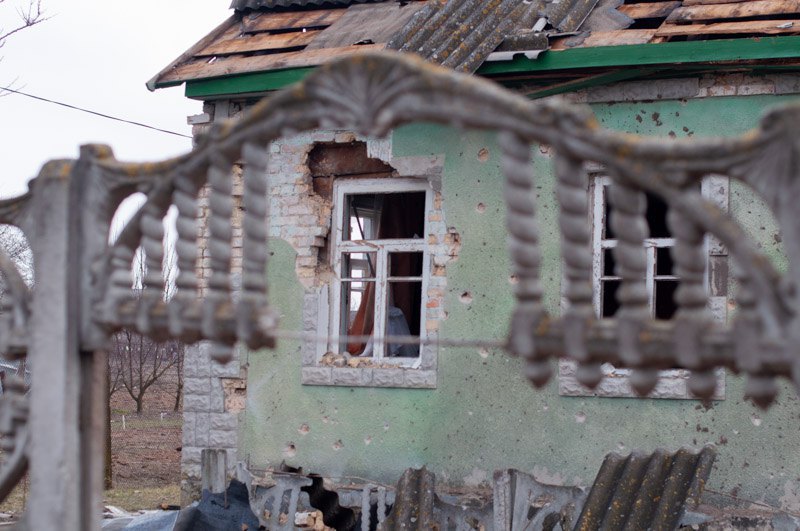
Photo by Oleksandra Honcharuk
When they came over for the second time, were they the same soldiers?
One of them was the same - a Yakut or a Buryat. And the cannon was there. We saw that they were raiding neighboring houses again. So we realized they would come to us as well. I was in the basement with my daughter. My friend and her father met them.
My friend collected the remaining cereals, together with some other stuff. She threw those at russians and said: “Take it and get the fuck out of here!” Russians went nuts. They came down to the basement, looked at us and said: “Zdravstvuite!” [“Hello” in Russian]. They wanted to take our home-made canned food.
Were they surprised that you were not welcoming them as liberators?
They were! They were asking Toma: “Why are you so angry?”. Before that they said they were glad to meet her. To which she responded: “I am not glad at all”. They asked why. She explained: “Because you are not my guests. Why are you in my house? You came again to a place with a child in it and you are taking the food away. We were not waiting for you.” They were surprised and asked: “How come you are so bold?” They further inquired if she would remain “bold” when they shoot her father in the knee. She responded: “Why shooting at my father? You are talking to me, so shoot me.” They were really astonished by her standing against them. So they did not take anything from us the second time they came. We were the only household in the street from which nothing was taken.
They returned the car keys and the generator, half-empty and slightly damaged.
They were going to attack Kyiv, those youngsters. They said: “We are going to attack Kyiv and we will take it.” No idea why.
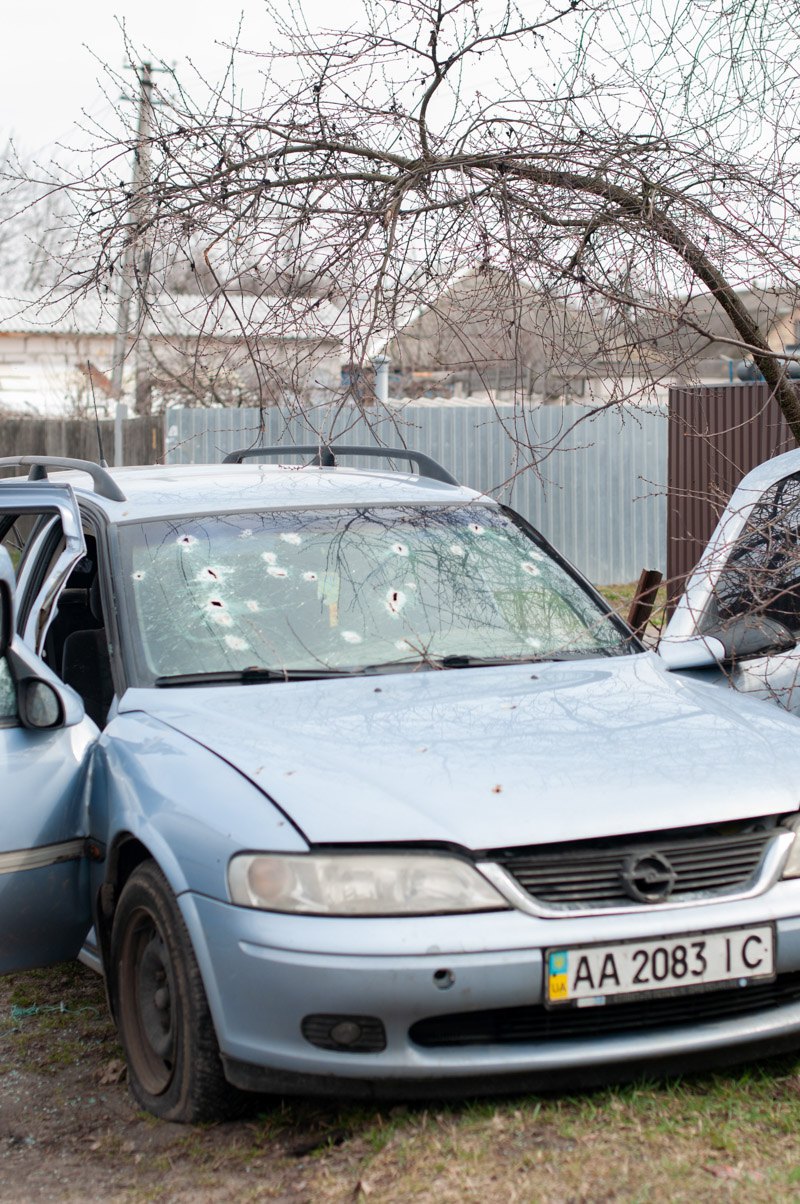
Photo by Oleksandra Honcharuk
People in Kyiv also have garlands, just another thing to be jealous of.
That’s right. Well, in our villages they did not steal TVs and toilets, as they say was the case in other places. I understand that all these yakut-buryat guys are particularly famous for it. They are very surprised that each house has a toilet and it works.
Obviously, there were people in the village who sent coordinates of russian military equipment to the dedicated chatbot. But our UAF operate carefully, they would not hit the village. So they waited until russians retreated. Once we saw a “bayraktar”, our guardian angel, hitting russian self-propelled artillery vehicles. We were very lucky, as one of them was directly targeting our house.
So the “bayraktar” was there just on time to destroy it?
Yes, it was. But they can’t always be on time. Russians do their thing and leave, it is difficult to find them afterwards.
Later we realized that when russians start shooting at the village, this means they are preparing to move their equipment, so they need everyone to hide. It looks like they were shooting blanks, but fragments still remain and they may get on fire.
Several times they hit very close to us, so I had to cover my kid with my own body and run to the shelter.
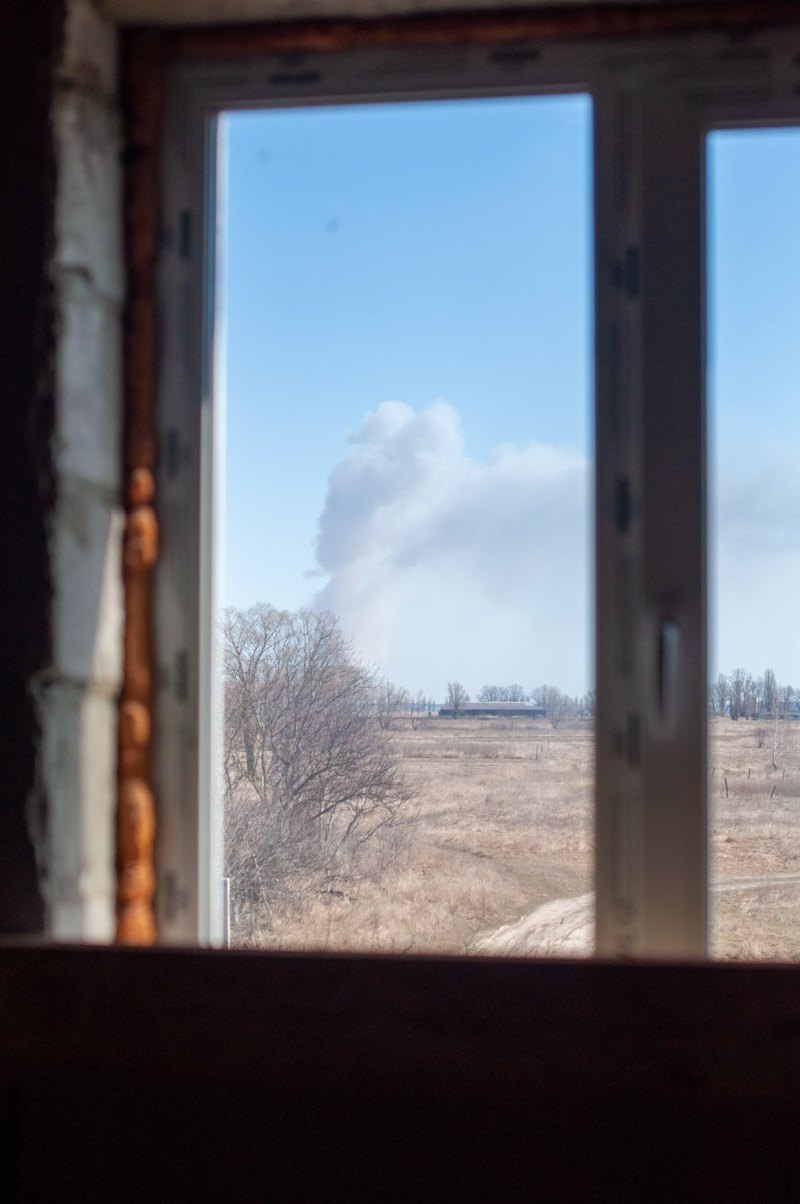
Photo by Oleksandra Honcharuk
How did you feel being there all this time with your child?
I guess the scariest time was when the russians came to our place. Otherwise, I even started sleeping in the basement. Before that I could not sleep at all.
It was freezing, -7 C outside for five or six nights. We had no heating, houses do not have furnaces. No gas, no lights, no heating. It was 9 degrees C inside the house. Our kind neighbor brought us an army-type potbelly stove. We tried to place it in the basement, it has a special ventilation system, but it still produced too much smoke.
So we put it outside. We had to cut wood and cook there. We also heated water outside to wash clothes and ourselves.
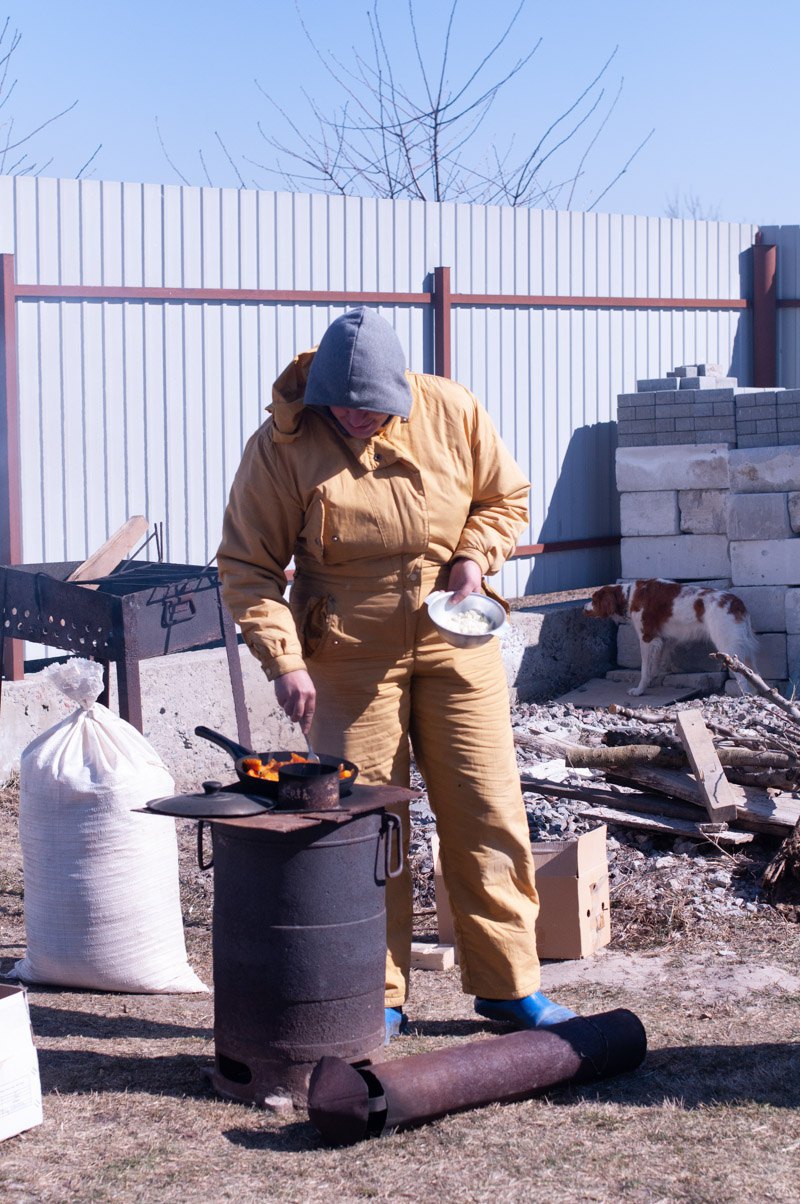
Photo by Oleksandra Honcharuk
Was it cold?
You know, we cover ourselves with two featherbeds, and my child is hot like a stove, so I felt very good. And what makes me happy is that my kid had something similar to a school break. There are many animals here and she does not see them in Kyiv. She learned to eat any food she is given and not be picky about it. Now the following argument works for her: “Do you want russians to take your food?”
The kid is playing around, she has fun. Yesterday and the day before yesterday she cried when it was not clear if we were liberated or not. She asked me what is going to happen to her when I die. And then she said: I will take your money and I will have “money-money”. So she takes it rather calmly. Of course, I will need to further monitor how she copes and see if there will be any deferred reaction. But generally I think our situation is not the worst one.
Has the electricity supply been restored?
Not yet. I guess it will take time, as many high-voltage cables were broken in the village. Restoring the railway connection is likely to take time as well, as those cables were also damaged.
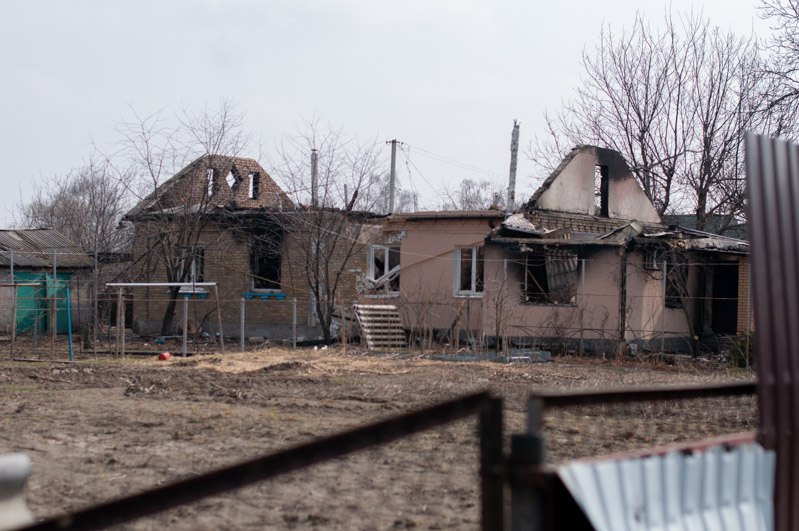
Photo by Oleksandra Honcharuk
Were there many people staying at the village all this time?
I suspect it was about half of the residents.
As soon as the green corridors were announced, people tried to run. But russian cannons placed in our vegetable gardens were shooting the green corridor.
“We even knew that when cannons start shooting, it is the green corridor day. We saw a missile targeting the green corridor. My kid said that it was not a green corridor, but a red one.”
Many people told us that if there is a green corridor we need to leave. But we saw that russians were shooting at it. At home you can at least hear how close the shooting is and hide in the basement. You can protect yourself, no matter how small the protection is. But when you are in a car going through the green corridor, there is nothing you can do. You can only wait and see if it hits you or not.
A dog came to stay with us - another one, as we had one already. Huge Shepherd, whom we are still taming. He does not trust people much, since he was abandoned once. But you can tell that he is trained, he is patrolling the territory. Many people left and some released their dogs, while others left them on a leash. They left pigs, cows. Our neighbor went off and left his nutrias to us. So we have nutrias now and we cooked their meat, it is very similar to chicken.
Neighbors feed the dogs remaining on a leash. Some dogs have become homeless. We try to feed them as well when we can, but we do not really have enough food for that.
How are things with food given that half of it was taken by the russians?
They did not take all of it. For instance, they did not take meat. Our fridge was not working as there was no electricity. While the temperature was below zero, we made an improvised one by freezing the water. Anyway we had to quickly eat everything that used to be in the freezer. While we still had gas, we urgently cooked 5 kg of veal liver that we stored for our dog. Then we ate this liver.
Here it was not as bad as in Mariupol or Chernihiv, since we are in the countryside. Someone has a stock of potatoes, others have carrots or home-made canned food. We came to the neighbors and brought stuff for them. They shared something in exchange.
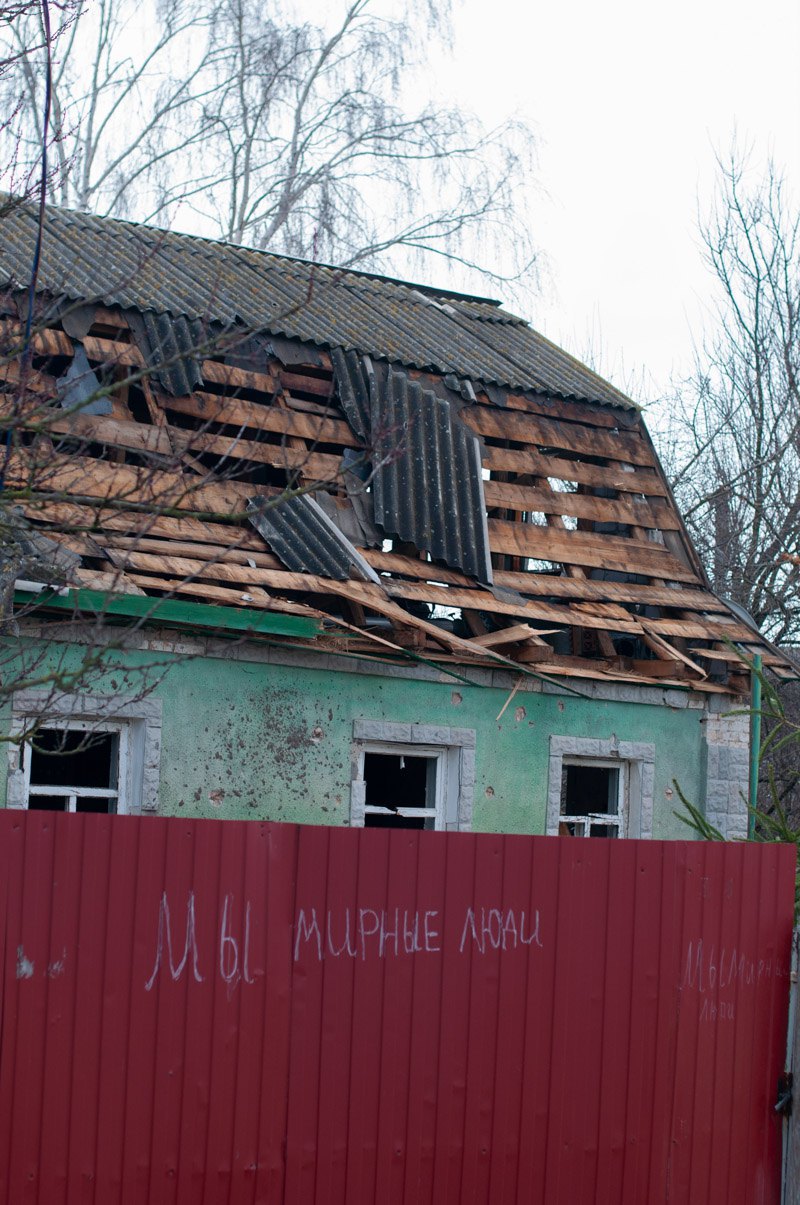
Photo by Oleksandra Honcharuk
How was the situation with the water supply?
Some people have outdoor hand pumps, where you can pump water yourself, so you could get it there. Taking it home could be a problem with something whistling around you. But we still washed our clothes and bathed. Essentially we lived as some still live in villages where there is no centralized water supply and the toilet is outside.
Being an urban person, I learned how to make fire.
How did you find out that you were liberated?
A confused neighbor came over and told us that our guys were at the village. Meaning that the UAF arrived. Russians may still be hiding somewhere in the village, I do not know for sure.
Are there villagers who died?
I am afraid so.
There was a case when people tried to leave by car and encountered a russian military column. They were shot to death immediately.
Village mayor’s car was hit by a tank, but he survived. By the way, I do not know where the village mayor was afterwards and who made arrangements about green corridors. We heard nothing about him, until bread was brought to the village.
One man was hiding in the cellar, he died as the missile hit the cellar directly. It is just a ruin now.
“Some of our neighbors had a hard time getting out of their basement. The entrance to the basement is in the garage. The garage was hit by a missile, everything went on fire. They had to break the window with their bare hands to get out. Both mother and her son have cuts all over their arms.”
The village had neither self-defense units, nor weapons. One of the local men threw a Molotov cocktail at a russian tank passing by. Russians shot him to death and did not allow people to bury him until they left.
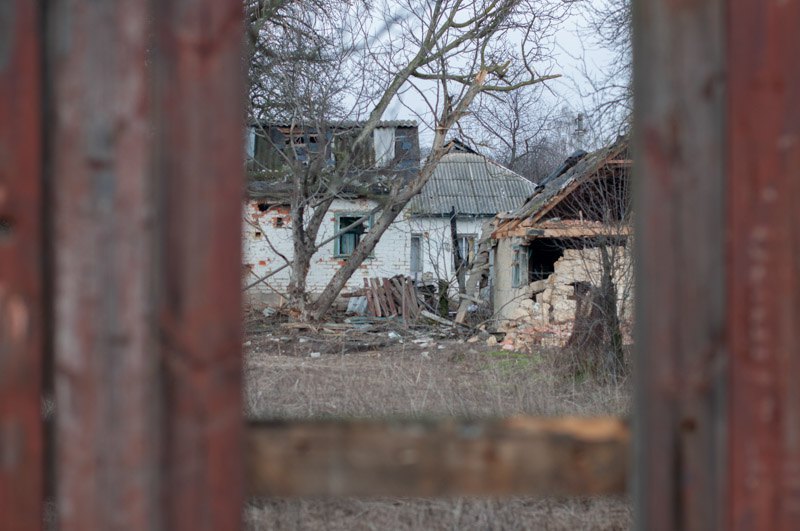
Photo by Oleksandra Honcharuk
Meaning until yesterday night?
Yes or the day before yesterday. I can’t remember now when exactly the village was retaken. You don’t really know what date and day of the week it is. Our phones were off all the time, we were hiding them and rarely charged them from the generator when no one could see us.
What are you intending to do next?
I do not know. My parents encourage us to get back to Kyiv, saying that russians have no interest in the Pozniaky neighborhood. My mother in law is from Ivano-Frankivsk, so she is obviously inviting us there. Everyone keeps telling me about safety and I respond: “There are no safe places now.” Missiles hit everywhere. We have had some positive experience in the countryside and we like it here. Moreover, it is gardening time, we need to get to it. The war will not end soon. So we have to be prepared for anything that comes.
We will probably go to Kyiv, so that my kid can at least pass the first grade.









